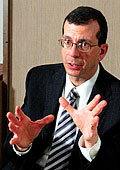|
Back
in 1992, when Henry Ross Perot Sr. ran for the American presidency,
he was a staunch opponent of offshoring. Ironic for a man who
rose from being a box seller at IBM to a billionaire entrepreneur
simply because he spotted the IT outsourcing opportunity first.
He launched Electronic Data Systems (EDs) in 1962 when his employer,
IBM, refused to move from hardware to services. The rest, as they
say, is history. Perot sold EDs to General Motors in 1984 for
$2.5 billion, and four years later set up Perot Systems Corporation.
Today, Perot Systems has $2.3 billion
in revenues and Perot Sr., who is Chairman emeritus (his son Ross
Perot Jr. is the Chairman), is singing a very different tune.
While Perot has always been for outsourcing, the company is now
looking at offshoring with a vengeance. And the man entrusted
with the task of turning Perot into another EDs is Peter
Altabef, Perot Systems' 48-year-old President & CEO.
A lawyer by training, Altabef joined Perot in 1993 and worked
in different positions before assuming his current role in September
2004. In India recently to inaugurate a new facility in Coimbatore,
Altabef spoke with BT's Venkatesha Babu
on how his company plans to make up for lost time in
India. Excerpts:
Where do you think Perot Systems stands
in the global technology marketplace today compared to legacy
players such as IBM and EDS as well as relatively new Indian vendors
like TCS, Infosys and Wipro?
There is movement among all these companies.
My perception is that everybody is moving towards the centre.
The traditional multinational companies are hiring more and more
people in what are called the low-cost destinations, whereas Indian
companies are ramping up their international presence in other
geographies. Perot Systems actually is (in one way) the leader
among the multinational group. We have about 30 per cent of our
(global) workforce in India and a little more than a third in
all low-cost destinations. So, we have been at the forefront (of
the movement). One of the things that distinguishes Perot Systems
is that we have been a strong growth company. While we have grown
our headcount in India, we have also grown our headcount in North
America. This is not true (of some of the other multinational
players). Since the headcount is also growing in North America
as it is in India, there is a sense of collegiality among our
teams, which is not true of some of our competitors.
The large Indian players say that they
have reinvented the IT services and consulting game to suit the
dynamics of a flat world. Would you say that companies such as
Perot Systems were late in recognising the potential of the whole
offshoring wave and is that the reason why you are now ramping
up here furiously?
Let me put this in context. About re-inventing
the marketplace. I think what they (read: Indian companies) have
done in terms of increasing the volume of some of the goods and
services in the marketplace is simply magnificent. It is to be
treated as not only advancing our industry but the capabilities
of all the customer industries. I don't want to take anything
away from them. They have done a superb job. That said, the it
outsourcing business was actually founded in 1962 by Ross Perot
(when he started EDs). He was originally a salesperson at IBM
and when he offered to take the IT outsourcing game to the next
level, they turned him down. That is how he started EDs and sold
it in mid-80s. He started Perot Systems in 1988. So, who understands
this entire it outsourcing business better than Perot Systems
because of our history and legacy?
Though Perot itself is a relatively new company,
we started doing business in Europe in 1990. We started our operations
in India in 1996 and work on it started in late 1994, though it
took us some time to get the formula right. Today, we operate
in 20-plus countries. So, I wouldn't say that we were late to
the game. It is just that we are very focussed. One of the things,
for instance, we are right now focussed on is not only service
delivery from India to our international customers but on the
Indian marketplace itself. I would admit that we are not early,
but very focussed on that now. We are excited about the Indian
marketplace, though we did have (Indian) clients, we had not focussed
our sales and business development teams here, which we are doing
now.
As a company with just over $2 billion in revenues, is Perot
an attractive takeover target in this fast-consolidating market
for either larger global rivals or fast-growing Indian vendors?
We are an attractive company (smiles) because
we are in the right marketplaces, with right capabilities. If
you look at Perot Systems, we get half of our revenues from the
healthcare marketplace. We are the leader in North America in
this space. Healthcare as a market is exploding not only in North
America, but also globally. The rest of our business (the other
50 per cent) is also in other strong growth areas. If you just
take organic growth, I think Perot Systems would have grown the
fastest among all the multinationals. In respect to whether we
are an acquisition target…we have a family kind of public
company with the Perot family holding approximately 30 per cent
of the company. So, realistically there is no way of us being
acquired unless the Perot family wants to sell and they have never
expressed an interest in doing so.
 |
|
"We are excited about the Indian
marketplace and are right now very focussed on it"
|
Despite being much smaller than competition,
Perot Systems continues to be #2 on Fortune's list of most admired
IT companies. So what are you personally and the company doing
right to be rated so high up?
We did come in second for the second year
in a row. Last year was the first time we had reached a size when
we are eligible to be voted. In our very first year, we came in
at #2. This year we were #2 again, but the gap between us and
the #1 has narrowed. So, we are improving all the time. Perot
Systems' goal is not to be the largest it company in the world,
but to be the best. If you are the best, growth will come automatically.
The important thing is to be a trusted partner for your customers.
You mentioned about shifting dynamics earlier of the industry.
One of them is long-term relationships. If you look at Perot,
85 per cent of our revenues comes from such long-term relationships.
The reason why we come up so high on most admired companies is
because of our relationships and the trust our customers have
in us. By the way, these relationships help us whether the economy
is going down or up.
There have been some worries over a potential
slowdown in the US. If that happened, what would be the immediate
and long-term impact on the technology market in general and Perot
Systems in particular?
As I did mention, a majority of our revenues
comes from long-term contracts. One of the things that Perot specialises
in is improving efficiencies of our customers. So, if there is
a slowdown, clients' focus shifts from growing topline by leveraging
it to cutting costs using it and improving efficiencies. Since
we operate in both ways, whether the economy grows or not, it
has little impact on us. We do fine, regardless of the state of
the economy. With regard to the state of the American economy,
I would rather leave it to economists to interpret.
What I wanted to know was whether IT customers
are planning to increase or cut back on their IT spend.
One of the things we are seeing is that clients
are more cautious about the kind of contracts they are signing.
They are looking for more specialised, best-of-breed solution
providers. That is why those mega billion-dollar contracts are
getting fewer. You see more action in the $50-500 million range.
That is a clear trend. That is good news for us. Given our size,
we have always been focussed on that market.
We've seen many large companies (ABN-Amro,
General Motors) re-align their contracts, and a few Indian vendors
such as Infosys and Wipro have benefited as a result. Do you think
this trend of splitting work into the best vendors for each area
will continue and do you think Perot Systems could be impacted?
Where the marketplace is going is towards
firms that have specialised knowledge, domain expertise and experience
in specific industry verticals. Given that we have developed deep
domain expertise in areas like healthcare, Perot will obviously
(benefit).
 |
|
"Our goal is not to be the largest,
but the best IT firm"
|
Perot gets bulk of its revenues from just
two verticals: healthcare and government. What have you done to
broad base revenues and dispel this impression that the company
is a two-trick pony?
Quite a lot. I would agree that we are very
strong in the areas you have mentioned. We are also active in
other segments of the marketplace where we have been leading the
marketplace. One of them is engineering outsourcing. This is not
in software engineering but product engineering. We have taken
our workflow systems and our efficiencies and are helping our
customers. For instance, like designing pieces of washing machines
and motorcycles. That business for us grew at over 50 per cent
last year (though admittedly on a small base). Let me give you
another example. We acquired a North American company in 2005
in the life insurance policy administration space. We are now
in North America among the top 5 in its space. We have now brought
those processes to India, which gives us an onsite and offshore
advantage.
There have been some issues over loss
of confidential customer data in the US government sector, where
you and ACS lost some customer data. Given the large deals you've
won in the government sector and your significant presence in
the healthcare market, what are you doing to handle these issues?
Let me clarify that in Perot Systems' case,
it was a single isolated event. Also the disc containing data
was recovered and there was no leakage of data. But aside from
that, (security) is always an issue. We have taken a number of
steps to increase security. In some cases, there are no copy machines,
in others, there are no recorders allowed, and access at terminals
is limited.
Of Perot's 22,000 employees, around 7,000
of them are in India. What kind of expansion plans do you have
here? Does Perot plan on buying a local firm or buying a global
one with large Indian operations (like Capgemini did with Kanbay)?
We look for acquisitions strategically and
not for scale, because integration challenges will be difficult.
We have an acquisition pipeline, for instance, to further strengthen
our already strong presence in the healthcare market. This is
true both in the us and abroad. We are actively looking for acquisitions
in application and more specifically financial services. You mentioned
(EDs and Capgemini). We are in a different position. We already
have a third of our workforce in India, which they (clearly did
not). We are a fiscally conservative company. So we will look
at the right fit, right company, right geography. At present,
we feel that valuations are too stretched. In the US, for example,
we were looking for two years in the government space. Only after
the market cooled, did we make an acquisition.
Despite the growth of India as an offshoring
and outsourcing base, a people crunch could potentially slow down
the growth of the Indian IT story. Do you think this is a fair
concern? Will the shortage of people make you look at other locations
such as the Philippines or China as an offshoring base?
Yes, that is a concern, but Perot is doing
its bit to improve it. We are working with institutions, universities
here. However, unlike for some Indian players, for us it is best
shoring and not just offshoring. We recently opened a centre in
the
Philippines. Having said that, we continue
to believe that the Indian marketplace and talent offer very good
opportunities. Just look at our help wanted ads. We are hiring.
India continues to be the heart of our global strategy, though
it is becoming a part of a larger puzzle.
Away from the offshore presence Perot
has in India, there have also been some reports that you are looking
at the domestic IT business here, just as IBM and HP do. Why are
you examining this sector now and do you have specific targets
you could share with us for this segment?
India is very important to us. The head of
our global consulting and business applications (Padma Ravichander)
sits here. Head of our business process relationship and insurance
vertical is Anurag Jain. We have leveraged India and Indian talent
to serve our global customers, but as I did mention earlier, we
want to tap the potential of the Indian marketplace. We definitely
have certain numbers, but those are internal. We are bullish on
our growth prospects in the Indian market.
|







